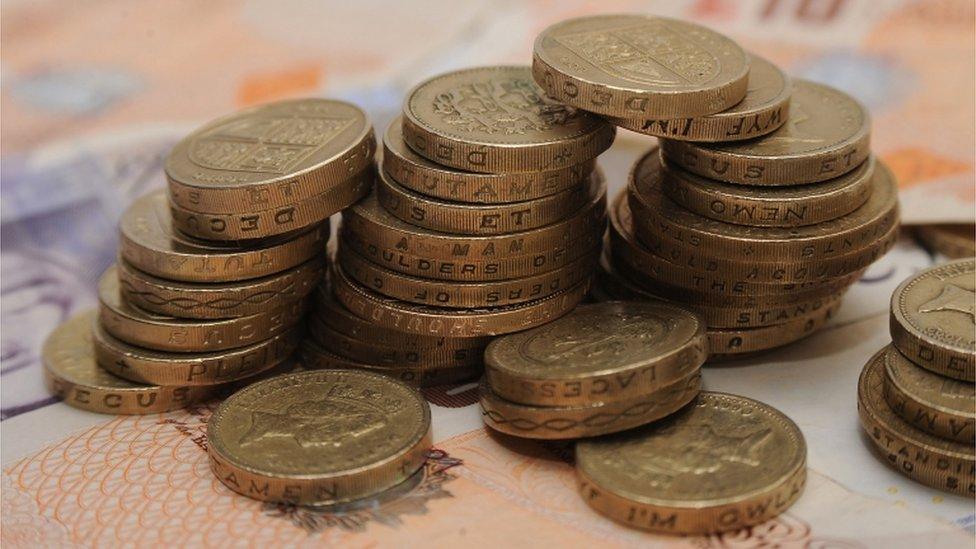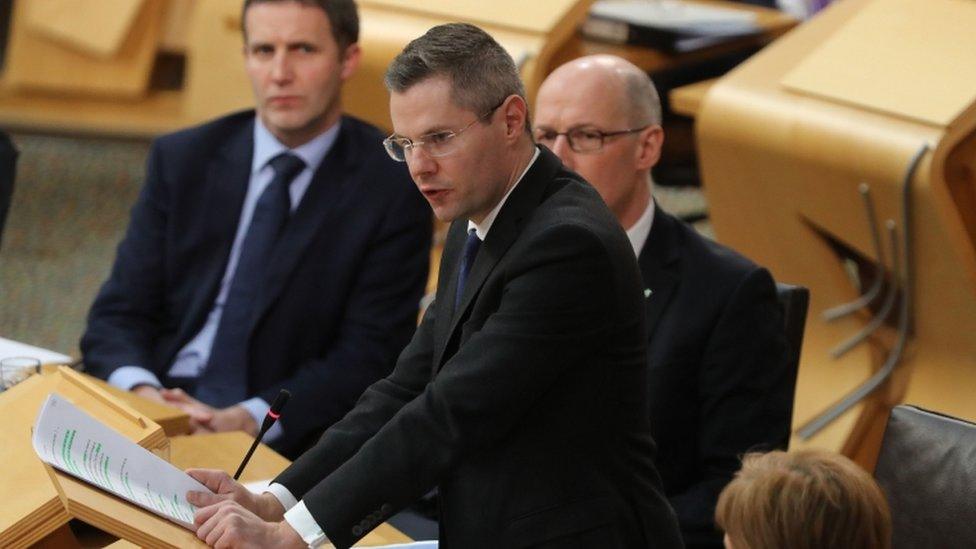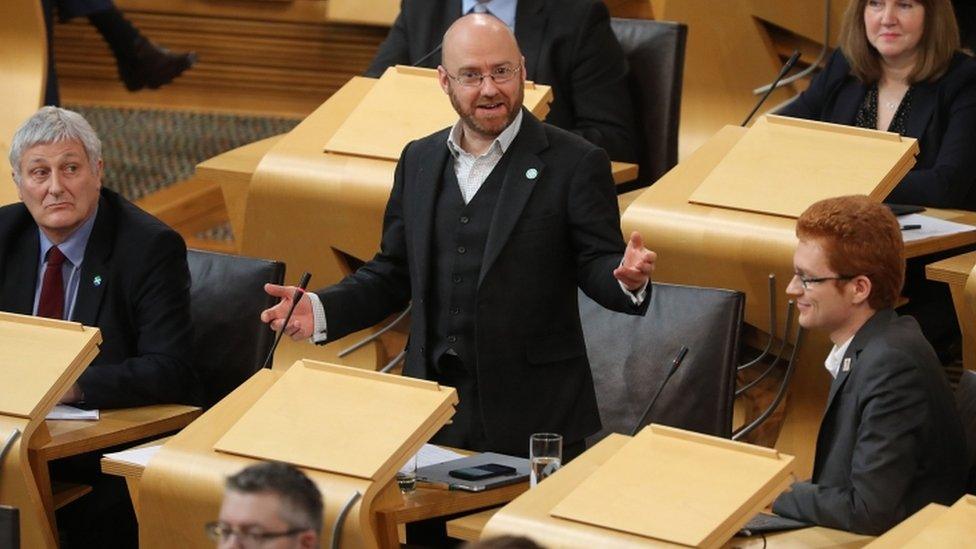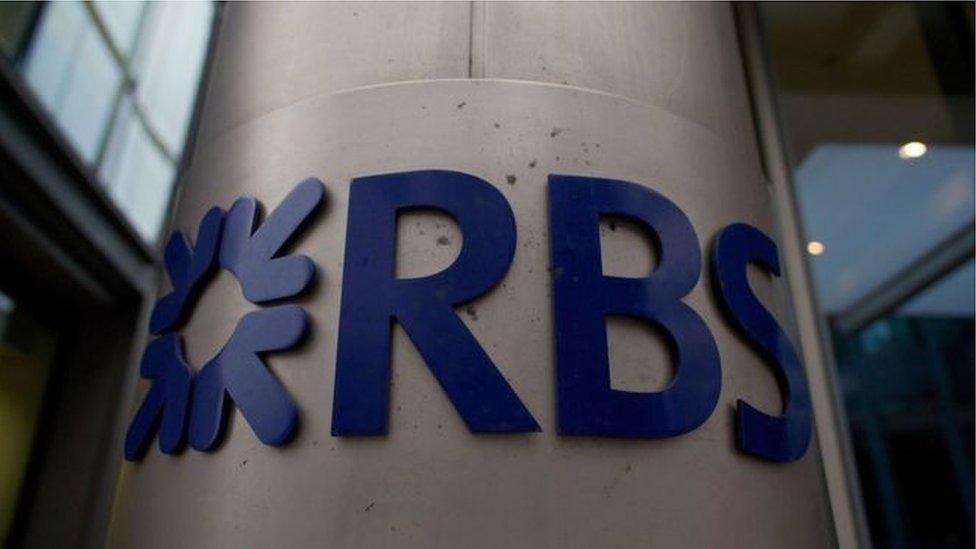Holyrood tax: hold the threshold
- Published

It has long been asserted that Scots believe more strongly than their neighbours in a social contract in which the well-off contribute more towards the common good.
So, to sustain or improve the level of public services, Scots would dig deeper into their income to pay higher taxes - if only they had the tax powers to do so.
Well, we're about to find out if that's true. The draft budget published by Derek Mackay in December set out a minor divergence from the tax thresholds set at Westminster.
Not the rates, you'll note. They remain the same. And only one threshold.
Labour MSPs would like that also to include the £150,000 earnings threshold, pushing up the 45% rate to 50%.
This is despite a real prospect that it could actually lower the amount of total tax revenue. Higher earners have a bigger incentive to re-arrange their finances so that they can pay less tax across the border.
Odd winners
But Labour hasn't been in negotiations with Derek Mackay to get him over the threshold that most concerns him - a majority vote of MSPs when the 2017-18 Budget Bill comes up for its final reading.
The Greens and the Lib Dems have. They both wanted to use their leverage to get something for which they could claim credit. And a deal such as this helps these small parties look relevant.
Mr Mackay would have liked both groups at least to abstain. It seems the Lib Dem shopping list - mainly education and mental health - was too expensive.
The Greens have agreed to let the SNP get its bill through for a more modest compromise.
On the spending the side, the changes to the December draft plan feature local authorities as the main gainers. Perhaps there's a council election coming.
The other gainers are rather odd. You might have expected the Greens to demand more for home insulation, cycling or alternative heating grants.
Yet the other gainers from the re-jigged figures are Police Scotland and Scottish Enterprise. Neither law 'n' order nor business support have ever been notable for firing up the Green heartland, if there is such a thing.
Perhaps because the SNP itself figured, in the past six weeks and without any Green or LibDem prompting, that it needs to do more to help out these two big agencies.
The economy, in particular, is not looking as healthy as it might, so the previously planned cut to the enterprise budget is being reduced.

Derek Mackay held long-running talks with other parties in an attempt to reach a compromise that would allow the budget to pass
What, then, about tax? This is the first year of really significant income tax powers coming to Holyrood. The SNP administration has been under opposition pressure to mitigate service cuts by using those tax powers. It planned to do so only modestly.
To explain: that threshold for the 40% higher tax rate is being given priority by Conservative ministers in Whitehall.
While in coalition with Lib Dems from 2010 to 2015, the tax priority was to raise the income tax allowance at the bottom end. It's risen from less than £7,000, to more than £11,500 from April.
Fiscal creep
The Tory priority now is to raise the level at which people start paying the higher rate of tax.
It has been pegged back around £40,000 for years, drawing more and more people into it, including those who consider themselves to be middle-income (and often Tory voters). That stealth tax is what's known as fiscal creep.
So the manifesto commitment is to raise the threshold to £50,000 by the 2020 Westminster election - well ahead of expected inflation.
That comes at a cost, if you measure it by the amount of tax revenue that won't be coming into the Treasury. It reckons the cost is £2bn during the next financial year, rising to £2.6bn by 2020-21.
Again according to Treasury figures (issued last March), that should mean £190m less being taken from more than 350,000 Scottish taxpayers than would otherwise be the case if the threshold rose with inflation. Or you can view it as 14,000 fewer Scots taxpayers being in the higher rate band.

Patrick Harvie and the Scottish Greens agreed a deal after receiving concessions on council funding and income tax
The judgement made by the SNP administration at Holyrood was that it's not a priority to raise that threshold - not at a time of austerity, anyway.
So instead of raising the threshold higher than inflation, the intention was to raise it by inflation, to £43,430.
So for anyone earning more than £45,000 next year - and that's nearly 15% of taxpayers - they were due to pay £314 more in tax than someone on the same salary in the rest of the UK. (Note that, on anything above £45,000, they're paying the same rate.)
The effect of the deal done with Green MSPs is that the threshold does not rise with inflation, but it's frozen, at £43,000. So under the budget deal, anyone earning more than £45,000 in Scotland will pay £400 more in tax than they would on the same salary elsewhere in the UK. The difference totals £29m or so.
For that, they might well receive free prescriptions, more generous social care, a better (or less crisis-stricken) health service and free student tuition.
It might well be a price higher earners are willing to pay. They might even be a wee bit grateful that the threshold wasn't reduced below £43,000. I'm reliably informed that idea was considered during these negotiations.
But suppose that threshold were to be frozen until 2020: if the Treasury meets its manifesto commitment, the gap would rise to £1,400.
There are further, deeper spending cuts scheduled by Westminster before 2020. The SNP will still be in a minority through these years, and will have to return to budget discussions with the Green MSPs and others, which could see income tax rates (20% for basic and 40% for higher rate) put back on the table for possible increases.
Payments or perception?
It makes you wonder the point at which taxpayers begin to complain, or to re-arrange their tax affairs.
It also makes you wonder if there might be an appetite for introducing an intermediate band at, say, 30%, to soften the impact of rising tax bills for middle-range earners.
It hasn't taken Scottish Conservatives long to campaign against council tax increases, after nine years of being frozen. Ruth Davidson's party clearly thinks tax and spend choices, which SNP ministers were eventually bound to make, present a political opportunity on the centre right.
What we don't know is how higher tax bills could affect behaviour - reducing growth of economic output and total tax revenue. That's a headache confronting public sector accountants and economists.
The political problem may be less one of the actual bill being paid, and more one of perception.
The description of Scotland as "the most highly-taxed part of the UK" may sound reassuringly Scandinavian to some, but is not seen as a helpful signal to business, entrepreneurs or inward investors.
- Published26 January 2017
